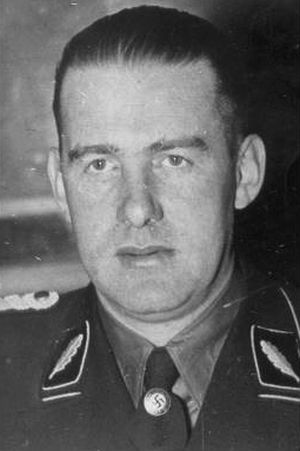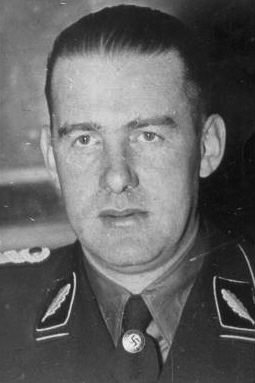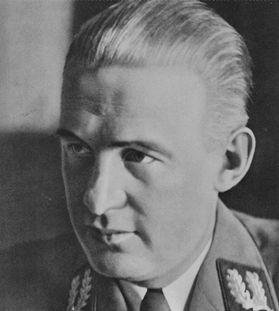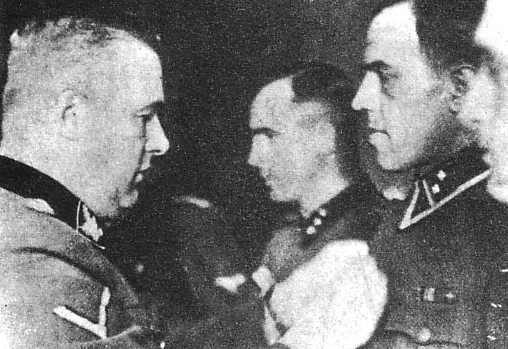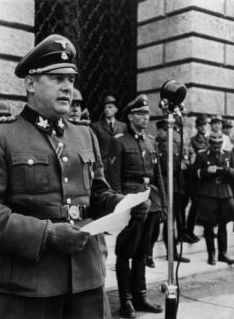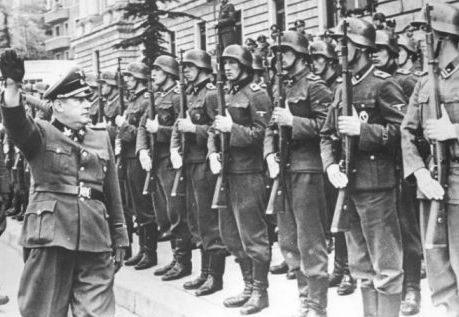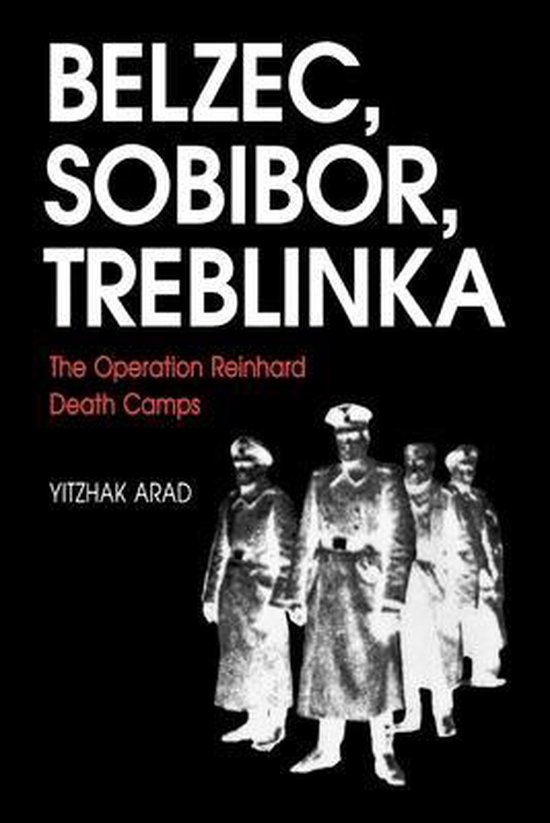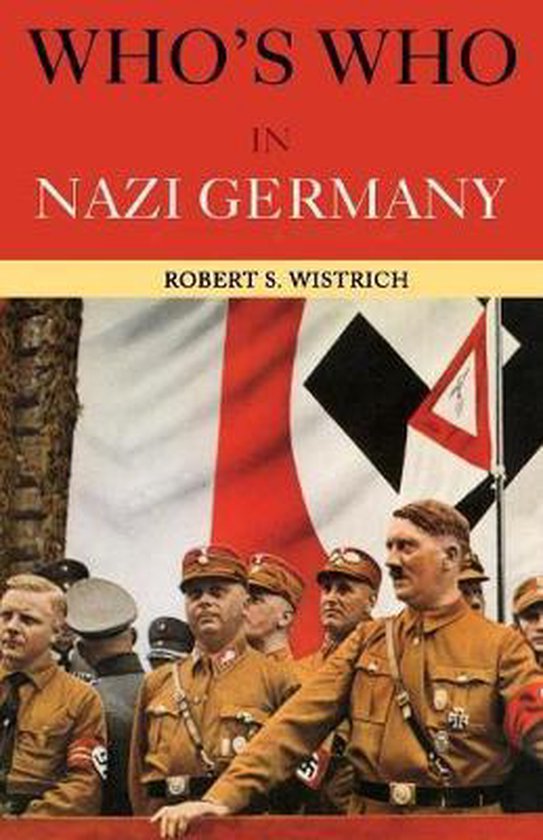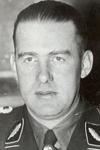Introduction
The Austrian Odilo Globocnik was in charge of Aktion Reinhard, the code name of the Nazi operation to exterminate the Jews in the Generalgovernment in Poland in the extermination camps of Belzec, Sobibor and Treblinka. In these camps, an estimated 1,7 million Jews were murdered. During his career, Globocnik often collided with other Nazi leaders for his self-willed attitude. He even was relieved of his function in the party in 1939 for corruption. Nonetheless, he enjoyed Himmler’s confidence and was given numerous functions and tasks within the SS.
Definitielijst
- Jews
- Middle Eastern people with own religion that lived in Palestine. They distinguished themselves by their strong monotheism and the strict observance of the Law and tradition. During World War 2 the Jewish people were ruthlessly persecuted and annihilated by the German Nazis. . An estimated 6,000,000 Jews were exterminated.
- Nazi
- Abbreviation of a national socialist.
Images
Beginning and end of his party career
Odilo Globocnik was born on April 21, 1904 in Trieste, at that time still part of the Austro-Hungarian Empire. His father fought as an officer in the Austro-Hungarian army during World War One. Odilo was too young to take part in the fighting but did enter military training in 1915. After the break up of the Austro-Hungarian Empire, the Globocnik family moved from Trieste, meanwhile part of Italy, to Klagenfurt in Austria, probably in 1923. The end of the war caused Globocnik to end his intended military career. He took an advanced vocational training and subsequently went to work as an architect.
In 1922, Globocnik joined a Carinthian paramilitary organization that maintained close ties with the German N.S.D.A.P. and in 1931 he became a member of the German Nazi party. Subsequently, he played an important role within the N.S.D.A.P. in Carinthia and also was leader of the party for some time. Because of his activities for this political party, which was illegal at the time, he was summoned to court five times for high treason. He also was allegedly involved in the murder of a Jewish jeweler in Vienna. In total, he spent 11 months in prison.
During the Anschluß in 1938, Globocnik acted as an important intermediary between Austria and Germany. After Germany had annexed Austria, Globocnik was appointed secretary of state on March 15, 1938 in the new Austrian government headed by Arthur Seyss-Inquart. Shortly after, in May 1938 he was appointed Gauleiter of Vienna. He held this function for a short time only because on January 30, 1939, he was ousted for corruption. Certain internal conflicts with other party members had also played a role in his discharge.
Prior to the Anschluß, Globocnik had become a member of the SS. His career within the party leadership may have been over but he found new chances within the SS. Globocnik volunteered for the Waffen-SS and served a short while as SS-Untersturmführer in the SS-Standarte Germania, part of the SS-Verfügungstruppe. Despite SS leader Heinrich Himmler’s abhorrence of corruption and although this was sternly dealt with in the SS, in November 1939 he named Globocnik SS- und Polizeiführer in the Lublin region of the General Government. The fact that Globocnik’s career was saved by Himmler made him a dedicated associate of the Reichsführer-SS.
Definitielijst
- Gauleiter
- Leader and representative of the NSDAP of a Gau.
- Germania
- The capital of the Third Reich after the war. Designed by Albert Speer, but never realised.
- Nazi
- Abbreviation of a national socialist.
- Waffen-SS
- Name of Military section of the SS.
Images
SS- und Polizeiführer in the Lublin district
During his tenure as SSPF Globocnik made a reputation of violence for himself. For instance, in the spring of 1940 he had ordered his subordinates to tie hundreds of prisoners, including many Jews together and drown them in the river Bug. The river was frozen over so the prisoners were able to flee to the other bank where the Soviet zone of occupation began. Here they were driven back however by Soviet soldiers. Globocnik’s men opened fire on the prisoners to prevent them from returning. Eventually, the Russians blew a hole in the ice and the men drowned.
We can also learn about Globocnik’s cruel mentality from his opinion about the Dirlewanger battalion. This battalion, commanded by Oskar Dirlewanger was charged with guarding thousands of Jewish laborers working on an anti-tank ditch in the defensive line between the rivers Bug and San in the Lublin district. Globocnik was full of praise about Dirlewanger’s leadership. "During the work on the ditch near the Bug and leading the camp for Jews in Dzikow, Dirlewanger commanded his unit in an extraordinary manner." Globocnik praised the "extraordinary service" of the Dirlewanger battalion. The true nature of these "extraordinary service" becomes clear from investigation by SS judge Konrad Morgen. According to Morgen, Dirlewanger had "arrested Jews," imprisoned them and had them shot or liberated after having paid a certain amount of money. (..) he had a whole suburb of Lublin sealed off, looted systematically and had the booty sold by Jews; (..) Jew were subjected to horrible cruelties such as "scientific experiments" torture and so on.
Just like when he was Gauleiter in Vienna, Globocnik soon got into conflict with other Nazi officials. Due to his independent and self-willed conduct he collided in particular with General governor Hans Frank and the governor of the Lublin district, Ernst Zörner. Despite their protests however, they did not succeed in getting Globocnik transferred or discharged, as had happened in Vienna. This time, Globocnik had two powerful patrons: the Höhere SS- und Polizeiführer in the General government Friedrich-Wilhelm Krüger and in particular Heinrich Himmler of course.
Definitielijst
- Gauleiter
- Leader and representative of the NSDAP of a Gau.
- Jews
- Middle Eastern people with own religion that lived in Palestine. They distinguished themselves by their strong monotheism and the strict observance of the Law and tradition. During World War 2 the Jewish people were ruthlessly persecuted and annihilated by the German Nazis. . An estimated 6,000,000 Jews were exterminated.
- Nazi
- Abbreviation of a national socialist.
Images
Colonization plans of the SS.
On July 20, 1941, Himmler traveled to Lublin for a meeting with Globocnik. The Reichsführer-SS wanted to discuss his plans for the colonization of the east with him. Three days previously, Globocnik had been named "Beauftragter des Reichsführers SS für die Errichtung der SS und von Polizeistützpunkten im neuen Ostraum". This meant Globocnik was tasked with preparing the newly captured territories in the east for colonization by the SS and establish points of support for the police. Both Jews and Poles were to reside in especially designated areas where they were to do forced labor for the Germans.
As Rudolph Höss, former camp commander of Auschwitz and chief of department D of the SS-WVHA (Main Economic and Adminstrative Agency) described in his memoirs after the war, Globocnik saw no problems in implementing his fantastic plans as to the colonization of the east and the exploitation of Jews and Poles. "He waved counteractions away with a flick of the wrist. He wanted to exterminate all Jews immediately he did not need for labor in his police support points. He wanted to collect all their possessions in large assembly camps to be used by the SS. He told all this in his Viennese dialect during a cosy chat at the fireplace one night as if it concerned the most innocent story." Although Höss had learned from his superior, Richard Glücks that Globocnik was highly regarded by Hinmler, the former camp commander of Auschwitz had no positive first impression of Globocnik: "My first impression was right. Globocnik was a noisy fellow who understood very well how to focus attention on his personality and how to describe his plans as if they had been largely realized." Höss wrote Himmler believed Globocnik and that he kept him in his function despite "attacks from all directions: SD, General governor, district governor and so on".
During his meeting Himmler ordered Globocnik to build a new concentration camp for 25,000 to 50,000 prisoners in order to provide for labor and material. In the summer of 1941, this camp was erected in Majdan Tatarski, a suburb of Lublin. Eventually, the camp became known as Majdanek. The camp was directed by the SS-WVHA headed by Oswald Pohl but in his capacity as SSPF in the Lublin district and executor of Aktion Reinhard, Globocnik was closely involved in the affairs in the concentration camp. Rudolph Höss wrote that Globocnik considered Majdanek a camp of his own. "He gave orders and directives to the commanders that were in direct contradiction with the orders of the inspector of concentration camps, Richard Glücks or Oswald Pohl," which caused arguments regularly.
Under Globocnik’s direction, Lublin had grown into an important economic center for the SS. In December 1940, a branch of the Deutsche Ausrüstungwerke was established where prisoners were deployed as slave laborers. In the summer of 1941, a clothing factory was also opened here. Again, prisoners from concentration camps in the area were forced to do labor. In March 1943, Globocnik became head of the Ostindustry GmbH or Osti, a company which employed the remaining Jews in the General Government as forced laborers in labor camps in order to take advantage of the low cost of labor.
Definitielijst
- concentration camp
- Closed camp where people are being held captive that are considered to be anti- social, enemies of the state, criminal or unwanted individuals. These groups mostly do not get a fair trial or are condemned to doing time in a camp.
- Jews
- Middle Eastern people with own religion that lived in Palestine. They distinguished themselves by their strong monotheism and the strict observance of the Law and tradition. During World War 2 the Jewish people were ruthlessly persecuted and annihilated by the German Nazis. . An estimated 6,000,000 Jews were exterminated.
Aktion Reinhard
Whether Himmler has spoken exhaustively about the execution of Aktion Reinhard during his meeting with Globocnik in July 1941, is an open question. It is very likely because in order to execute his task to prepare the east for colonization by the SS, Globocnik considered it necessary to cleanse the General Government of all Jews. He had even proposed to starve all Jews to death who came to the General Government. It is certain that Globocnik had started to build a camp in Belzec in October 1941 where experiments were conducted to gas Jews in fixed gas chambers. In May 1942, the first transports arrived from the Lublin ghetto. Two more extermination camps were erected after the Belzec model for the execution of Aktion Reinhard: Sobibor and Treblinka.
As the leader of Aktion Reinhard, Globocnik was also conceited, according to Höss. Globocnik liked to brag about the capacity of his extermination camps. "Globocnik caused Eichmann a lot of trouble,"so Höss writes. "While I was constantly arguing with Eichmann about slowing the transports of Jews down, Globocnik could not have enough of them. He wanted to be up front with his ‘exterminations’, with ‘his’ values gained in the process." Höss writes, Globocnik had paid a visit to Auschwitz in the summer of 1943 to watch the functioning of the crematoriums and the extermination process but, "he did not consider all this overly spectacular. His installations operated much faster and he started throwing figures around of his extermination rates. He bragged shamelessly."
That Globocnk was regularly overstating things, can also be seen from the Gerstein report, a report SS officer Kurt Gerstein drafted after the war on his experiences in the extermination camps. Gerstein describes how he had a meeting with Globocnik in Lublin in August 1942. He was told Globocnik needed him to improve the extermination process. Globocnik told Gerstein how secret the operation was and that anyone caught talking about it, was executed out of hand. Two days before Gerstein’s visit two chatterboxes had been shot, according to Globocnik. Although the operation was a Geheime Reichssache (secret state affair) and those involved in the operation had to sign a contract confirming their silence, the execution of persons violating this agreement is probably an exaggeration by Globocnik. There are actually no other sources pointing at this.
Gerstein also describes how Globocnik told him about a visit by Hitler and Himmler to Lublin where they discussed the extermination program. According to Gerstein, Globocnik said Hitler had ordered him to speed up the action. When Hitler’s companion, Ministerialrat Dr. Herbert Lindner asked Globocnik if "he considered it good and correct to bury all corpses instead of burning them because after us, a generation can come that does not understand all of this," Globocnik answered – according to Gerstein - : "Gentlemen, if a generation comes after us that is so weak and weak hearted, then national socialism has missed its mark altogether. I am therefore convinced of the opposite: that bronze memorial tablets will be erected saying we have taken the trouble to execute this grand and so necessary task." In Globocnik’s words, the Führer would have said to this: "Correct, Globocnik, that is also undoubtedly my opinion."
If Gerstein speaks the truth and Globocnik has actually told him this, then the leader of Aktion Reinhard was lying. The meeting with Hitler he mentioned, has never taken place. This matches the words of Rudolph Höss who described Globocnik as a "dreamer who even was able to tell the Reichsführer-SS the most crazy fairy tales." A second conclusion we can draw from the Gerstein report, assuming Gerstein is speaking the truth, is that Globocnik had no compunction whatsoever about the genocide he led. He was even proud of it and therefore advocated the placing of memorial tablets; of course not in memory of the victims but in honor of the perpetrators of the mass murder. It seems certain Gerstein did not make this up because it appears from other sources that Globocnik was very satisfied with the work he did. In a letter he sent to Himmler’s chief of staff Karl Wolff on July 22, 1942, - after the Reichsführer had ordered more deportations - he wrote: "The Reichsführer-SS has provided us with so much new work that it enables us to fulfill our most secret wishes. I am extraordinary grateful to him and he can be sure these wishes will be fulfilled in a short while."
Under Globocnik’s direction an estimated 1.7 million Jews were murdered in the extermination camps Belzec, Sobibor and Treblinka. From a Nazi viewpoint, Aktion Reinhard was a financial success as well. In a report Globocnik sent to Himmler on January 5, 1944, he gave an enumeration of the money, the gold and other valuables stolen from the Jews during Aktion Reinhard. Converted to Reichsmarks, Globocnik arrived at a total amount of 178,745,960.59 Reichsmark. When he sent this report, he was no longer employed as SSPF in Lublin though. On September 13, 1943 he had been promoted to HSSPF in the Adriatisches Küstenland (Adriatic coastal area), the region around Trieste. The reason for his transfer to Italy may have had to do with the conflicts with colleagues in the General Government he was embroiled in since the beginning of his career. It is more likely however, he was transferred because Aktion Reinhard had come to an end in the meantime and the SS colonization plans had also been rendered impracticable by the influence of the war. Since the Allied landings in southern Italy, the number of partisan actions in northern Italy had increased sharply. There was an urgent need for German manpower in the region. Therefore Globocnik’s deployment in Italy was more important than in the Lublin district.
Definitielijst
- Führer
- German word for leader. During his reign of power Adolf Hitler was Führer of Nazi Germany.
- ghetto
- Part of a town separated from the outside world to segregate Jewish population. The establishment of ghettos was intended to exclude the Jews from daily life and from the rest of the people. From these ghettos it was also easier to deport the Jews to the concentration and extermination camps. Also known as “Judenviertel” or Jewish quarter.
- Jews
- Middle Eastern people with own religion that lived in Palestine. They distinguished themselves by their strong monotheism and the strict observance of the Law and tradition. During World War 2 the Jewish people were ruthlessly persecuted and annihilated by the German Nazis. . An estimated 6,000,000 Jews were exterminated.
- national socialism
- A political ideology drawn up by Hitler based on the superiority of the German race, the leader principle and fierce nationalism that was fed by the hard Peace of Versailles. National socialism was anti-democratic and racist. The doctrine was elaborated in Mein Kampf and organised in the NSDAP. From 1933 to 1945 National socialism was the basis of totalitarian Germany.
- Nazi
- Abbreviation of a national socialist.
- socialism
- Political ideology aiming at slight or no class differences. Means of production are owned by the state. Evolved as a response to capitalism. Karl Marx tried to substantiate socialism scientific.
Images
Italy
Globocnik left Lublin in September 1943, along with other colleagues of Aktion Reinhard, including Christian Wirth and Franz Stangl. Meanwhile – since November 1942, he held the rank of SS-Gruppenführer und Generalleutnant der Polizei. He would not reach a higher rank any more. Globocnik’s Italian headquarters were situated in Trieste. He was subordinate to HSSPF Italien SS-Obergruppenführer Karl Wolff. He himself commanded the SS und Poliziekommandeure in Friuli, Görz, Istria,Quarnero and Trieste. Globocnik occupied himself with the struggle against partisans. In addition to partisans, Jews and political opponents were also persecuted by Globocnik and his colleagues.
A large number of the arrested partisans, Jews and political opponents ended up in the notorious Italian concentration camp Risiera di San Sabba in Trieste. Between October 20, 1943 until the beginning of 1945 some 25,000 partisans and Jews were interrogated and tortured in this camp, 3,000 to 5,000 of them were murdered, for instance in gas vans. Other prisoners in Risiera di San Sabba were deported to the concentration and extermination camps in Germany and Poland.
As the Allies were advancing steadily, Globocnik fled from Italy to Carinthia. Along with some of his loyal associates, he went into hiding in an Alpine cabin on the Möslacher Alm near the Weissensee. On May 31, 1945, he was arrested by the British. The same day he committed suicide in the Carinthian village of Paternion by swallowing a cyanide capsule.
Definitielijst
- concentration camp
- Closed camp where people are being held captive that are considered to be anti- social, enemies of the state, criminal or unwanted individuals. These groups mostly do not get a fair trial or are condemned to doing time in a camp.
- Jews
- Middle Eastern people with own religion that lived in Palestine. They distinguished themselves by their strong monotheism and the strict observance of the Law and tradition. During World War 2 the Jewish people were ruthlessly persecuted and annihilated by the German Nazis. . An estimated 6,000,000 Jews were exterminated.
Images
Information
- Article by:
- Kevin Prenger
- Translated by:
- Arnold Palthe
- Published on:
- 19-01-2025
- Feedback?
- Send it!
